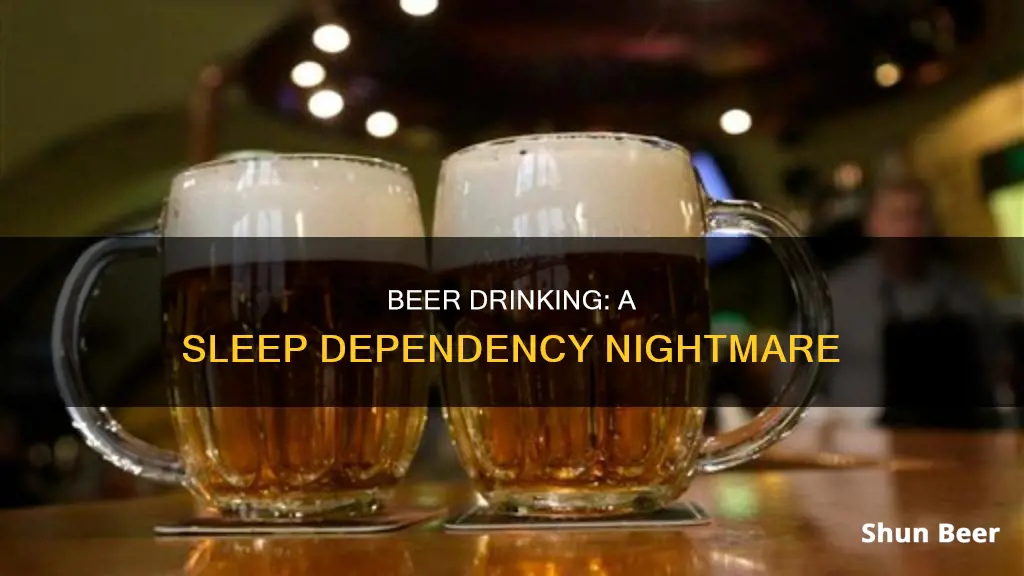
Alcohol is a depressant that slows down brain activity, making it a popular sleep aid for many. However, drinking before bed is detrimental to a good night's rest. Alcohol negatively affects sleep cycles, particularly the REM stage, which is crucial for memory, mood, and focus. It can cause more awakenings, leaving you feeling tired and fuzzy the next day. Even light drinking can reduce sleep quality, with higher consumption causing greater disruption. While alcohol may help you fall asleep, it interferes with sleep quality, and the negative impact is consistent from person to person.
| Characteristics | Values |
|---|---|
| Effect on sleep | Alcohol negatively impacts sleep quality and quantity. |
| It can lead to frequent wakings, low-quality sleep, and sleep disorders like insomnia and sleep apnea. | |
| Alcohol disrupts the sleep cycle by altering the duration of NREM and REM sleep stages. | |
| It can cause or worsen breathing issues like sleep apnea and snoring. | |
| Alcohol interferes with the release of circadian hormones, disrupting the body's natural sleep-wake cycle. | |
| It can lead to daytime sleepiness, drowsiness, and cognitive impairments the next day. | |
| Risk factors | Alcohol use disorder, older age, and pre-existing sleep disorders are risk factors for disrupted sleep due to alcohol consumption. |
| Combining alcohol with sleeping pills can be dangerous, making it difficult for an individual to breathe while sleeping. | |
| Recommendations | It is recommended to avoid alcohol close to bedtime, typically at least three hours before sleeping. |
| Drinking water along with alcohol and avoiding drinking on an empty stomach can help mitigate its negative effects on sleep. |
What You'll Learn
- Alcohol is a central nervous system depressant, acting as a sedative to slow down brain activity
- Drinking before bed can negatively impact sleep cycles, causing more awakenings and lower quality sleep
- Alcohol affects the production of melatonin, a hormone that helps regulate sleep
- Drinking can cause or worsen breathing issues such as sleep apnea
- Alcohol can harm your circadian rhythm, disrupting the natural release of hormones throughout the day

Alcohol is a central nervous system depressant, acting as a sedative to slow down brain activity
Alcohol acts on the inhibitory neurotransmitter gamma-aminobutyric acid (GABA), which slows down brain activity. GABA makes nerve cells less able to send, receive, or create signals, ultimately reducing activity in the brain. This leads to side effects such as relaxation, drowsiness, slurred speech, decreased inhibition, and problems with coordination.
While alcohol can make you feel sleepy, it may impact your overall quality of sleep. If you go to bed with alcohol still in your system, you may experience headaches, frequent awakenings, night sweats, more intense snoring, and nightmares. This is because alcohol can interrupt rapid eye movement (REM) sleep, which is important for dreaming, learning, and memory processing.
The more alcohol you drink and the closer you drink it to bedtime, the stronger its effects will be. It is recommended that you avoid alcohol for at least three to four hours before bedtime.
Beer and Sinus Congestion: Is There a Link?
You may want to see also

Drinking before bed can negatively impact sleep cycles, causing more awakenings and lower quality sleep
Drinking alcohol before bed can negatively impact your sleep cycles, causing more awakenings and lower-quality sleep. While alcohol may initially make you feel sleepy, it can disturb your sleep as it wears off.
Alcohol affects the four stages of sleep, particularly REM sleep, which is important for dreaming, learning, and memory processing. When you drink, you're likely to experience more N3 sleep (deep sleep) and less REM sleep. Later in the night, once your body has metabolized the alcohol, you'll likely experience more N1 sleep (the lightest stage of sleep), leading to fragmented sleep and frequent awakenings.
Alcohol also enhances the brain's levels of adenosine, a chemical that induces sleepiness. However, as your body works to eliminate alcohol from your system, adenosine levels quickly subside, making you more likely to wake up throughout the night. Additionally, alcohol increases slow-wave sleep patterns (delta activity) while also turning on alpha activity, which indicates wakefulness. Experiencing these two brain wave activities simultaneously is thought to inhibit quality rest.
The negative impact of alcohol on sleep is supported by a 2018 Finnish study that analyzed the sleep and alcohol habits of 4,098 adults. The study found that low, moderate, and heavy alcohol intake reduced sleep quality by 9.3%, 24%, and nearly 40%, respectively. The study also showed that alcohol affected men and women similarly and that it impacted younger people more than older adults.
To mitigate the negative effects of alcohol on sleep, it's recommended to allow a minimum of three hours between your last drink and bedtime. Drinking water along with alcohol and having a meal before drinking can also help. However, it's important to avoid alcohol if you're taking sleeping pills, as the combination can make it dangerous for a person to breathe while sleeping.
Fish and Beer: A Delicious Pairing?
You may want to see also

Alcohol affects the production of melatonin, a hormone that helps regulate sleep
Drinking alcohol before bed can have a detrimental effect on sleep quality. While alcohol can make you feel tired initially, it can also disturb your sleep as it wears off.
Alcohol negatively impacts the sleep cycle, causing more awakenings and fragmented, low-quality sleep. It can also lead to sleep disorders such as insomnia and sleep apnea.
When alcohol is introduced to the system, it reduces the amount of melatonin the body can create, interrupting the sleep cycle. This is particularly true if you drink within four hours of bedtime. Binge drinking, or consuming large amounts of alcohol in a short period, can alter melatonin levels for up to a week.
Combining alcohol and melatonin can have negative side effects, including drowsiness, dizziness, increased anxiety, and complications such as an abnormally fast heartbeat and trouble thinking clearly. It is recommended that you do not mix alcohol and melatonin, and that you wait several hours after drinking before taking melatonin supplements.
Rotten Beer: Is It Safe to Drink?
You may want to see also

Drinking can cause or worsen breathing issues such as sleep apnea
Drinking alcohol can cause or worsen breathing issues such as sleep apnea. Sleep apnea is a sleep disorder that causes breathing to stop and start repeatedly during sleep. It can lead to loud snoring, gasping, choking, or snorting sounds, as well as daytime sleepiness and low energy. There are three types of sleep apnea: obstructive sleep apnea (OSA), central sleep apnea, and complex sleep apnea.
Alcohol relaxes the muscles in the airway, which can cause obstructions in the upper airway and lead to sleep apnea. It can also increase the time between when a person stops breathing and wakes up to breathe again. Additionally, alcohol can cause nasal congestion, making it harder to breathe through the nose. These effects can worsen OSA and central sleep apnea.
Alcohol can also contribute to weight gain, which is associated with a narrowing of the airway and OSA. As a central nervous system depressant, alcohol can slow down the drive to breathe, making symptoms worse for people with central sleep apnea.
If you have sleep apnea, it is recommended to avoid alcohol, especially a few hours before bedtime. Drinking in the evening or before bed worsens sleep apnea and makes it more difficult to breathe. The more you drink, the worse the effect on your breathing and sleep.
CPAP (continuous positive airway pressure) therapy is the leading treatment for sleep apnea and can effectively manage the condition, even if you consume alcohol. However, it is important to maintain your CPAP therapy routine and consult with your doctor about an appropriate level of alcohol consumption.
In summary, drinking alcohol can cause or worsen breathing issues such as sleep apnea by relaxing the airway muscles, increasing nasal congestion, contributing to weight gain, and slowing down the central nervous system. If you have sleep apnea, avoiding alcohol, especially close to bedtime, is recommended to improve your breathing and sleep quality.
Minors and Alcohol-Free Beer: Is It Safe?
You may want to see also

Alcohol can harm your circadian rhythm, disrupting the natural release of hormones throughout the day
Alcohol can indeed harm your circadian rhythm, disrupting the natural release of hormones throughout the day.
The human body has an internal clock, which is known as the circadian rhythm. This clock is responsible for regulating several physiological, endocrine, and behavioural functions, including sleep and activity, body temperature, and hormone secretions.
Alcohol can alter the expression of circadian rhythms in a variety of behavioural, physiological, and endocrine functions. For example, alcohol can cause a phase-advance in the circadian rhythm of body temperature, which means that the overnight minimum in body temperature occurs earlier than usual. It can also blunt the amplitude or abolish the expression of circadian rhythms in functions such as locomotor activity, body temperature, sleep, food intake, and the secretion of the stress-related hormone, corticosterone.
Alcohol can also harm your circadian rhythm by decreasing the body's sensitivity to cues, like daylight and darkness, which trigger shifts in body temperature and secretion of the sleep hormone melatonin. These fluctuations play a vital role in the sleep-wake cycle, and when they are weakened or absent, a person may feel alert when they want to sleep and sleepy when they want to be awake.
Additionally, alcohol can cause or worsen breathing issues like sleep apnea, which can further disrupt your sleep. Sleep apnea is a disorder that causes repeated pauses in breathing during sleep, and it is linked to fatigue as well as serious cardiovascular conditions like heart attacks and strokes. When you have sleep apnea, drinking can make the breathing interruptions last longer when you are asleep, leading to more awakenings.
Beer and Tylenol: Safe Mix or Health Risk?
You may want to see also
Frequently asked questions
Alcohol can be a stimulant in some cases, and it can fragment your sleep, reduce melatonin, and cause or worsen anxiety and sleep disorders.
Alcohol affects sleep in many ways. It can be stimulating as blood alcohol levels rise, usually within the first hour of drinking, and if you drink a low dose. It can also be stimulating if you drink when your energy levels are naturally rising (like in the early evening).
Experts recommend avoiding alcohol at least 3 hours before bed. That said, some people may benefit from avoiding alcohol for even longer or abstaining altogether.
If you drink alcohol right before bed, you may experience headaches, frequent awakenings, night sweats, more intense snoring, and nightmares.
To sleep better after drinking, avoid alcohol at least three to four hours before bed, drink less alcohol, and improve your sleep hygiene, so nothing else (like coffee or bright light) disrupts your sleep.







